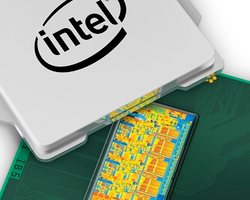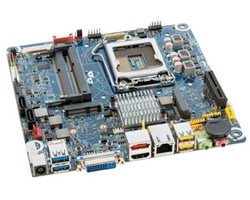Twenty-eleven is almost over and as we conclude our end-of-year articles it's time to look back at some of the most relevant stories of 2011. We'll do a brief recount of tech happenings in six categories: Desktop CPUs and Graphics, Hardware Industry, Devices and Components, Software, Gaming, Mobile Computing and The Web.
It's been quite an eventful year that's for sure. We hope you enjoyed our daily dispatch of PC technology news and analysis as much as we've enjoyed bringing it to you. Without further ado, here's our take on 2011.

Intel remains unchallenged in almost every segment of the microprocessor market. Their 2nd generation Core processor lineup was recently expanded with the arrival of three new Sandy Bridge-E parts for the enthusiast market, priced from $555 to a bone chilling $990. They provide up to six cores with a dozen threads, but from a price / value perspective, they're not necessarily a better buy than the already awesome Core i7-2600K.
Meanwhile, AMD's much ballyhooed FX brand relaunch was pretty disappointing, with Bulldozer struggling to compete well enough with the Core i5-2xxx series. Like previous years, the company has been left with no option but to respond with more affordable products. What's more interesting is that ARM and its partners continue to gain terrain in the microprocessor market as smartphones and tablets continue to rise in popularity – not to mention upcoming support for the architecture in Windows 8.
In the discrete graphics market it was a close fight between Nvidia and AMD, but the former still reigns supreme in terms of market share. AMD just unleashed their next-gen 28nm graphics products last week and took home the crown for fastest single-GPU offering. We're eagerly awaiting for Nvidia's response next month.

This year saw the debut of Intel's high-speed Light Peak interconnect, but so far only Apple has implemented across its products as Thunderbolt, while Sony tried a different approach with their Vaio Z notebooks. HP nearly dismissing its PC business unit despite its leading global position in terms of sales, was a huge story that didn't settle for months. Other technologies gaining terrain include USB 3.0, which comes standard on most computers these days, as well as SATA III 6Gbps for internal storage.
And speaking of storage we're a little disappointing that SSDs haven't reached mainstream pricing yet. Prices are coming down, however, and with manufacturers hedging their bets on flash storage for their Ultrabook offering we can only imagine the trend will continue into 2012. Plus, the hard disk drive shortage and price hikes triggered by the floods in Thailand are a real opportunity for SSDs to finally take off in a big way.
The PCI Express 3.0 specification was completed near the end of 2010 but compatible products are not expected to arrive until the first quarter of 2012, starting with the Radeon HD 7970.

On the software side, Apple released its next major operating system update with Mac OS X Lion 10.7 and Microsoft started previewing Windows 8. The latter will introduce an all-new start screen that gets rid of icons in favor of big tiles which can be customized to show live information or launch applications – taking a strong cue from the Metro UI used in Windows Phone 7.
This year also saw an explosion of app stores for mobile platforms and the transition of this model – popularized by Apple with iOS – into the desktop. Although undoubtedly a majority of desktop users still use more traditional channels to get their software, such as a developer's website or a downloads portal, we now have curated app stores for Mac OS X and Microsoft will be launching the Windows Store next year along with the public beta of Windows 8.

Although some of our most anticipated game releases for 2011 wound up being duds on some level (Brink, Crysis 2, Duke Nukem Forever, Homefront, to name a few), there were still a few gems worth playing – like Skyrim, for example.
Digital distribution platforms continued to gain massive popularity, so much that EA couldn't resist jumping into the game with Origin. Meanwhile, cloud-gaming service OnLive hasn't become a major player yet but it's taken a few steps in the right direction with its Android and soon to be launched iOS clients.
As far as consoles are concerned Sony and Microsoft continued to expand upon the PS3 and Xbox 360's capabilities through incremental updates. Only Nintendo announced its next-generation console, the Wii U, but details remain few and far between. The excitement over motion controlled gaming has waned a bit due to a lack of interesting titles. That said, now that Microsoft's Kinect has made the jump to PCs we're eager to find out what uses developers will come up with for the much-hyped peripheral.

Netbooks have lost their lure to simply become smaller, entry-level notebooks, while other categories are only seeing minor spec bumps – and in some cases slight price hikes as the ongoing HDD shortage takes its toll on PC makers. But if you are looking into the ultraportable market, a new breed of devices has emerged. Intel is pushing the Ultrabooks as thin and light systems with plenty of power, fast SSD storage, long battery life, and a price that won't break the bank. They're essentially the Windows version of Apple's MacBook Air and they're supposed to take over the notebook market in the coming years. For now we're seeing a first generation of devices, with plenty more to come.
When it comes to smartphones and tablets it was definitely a busy year, marked by a flood of releases from all the big name manufacturers and furious litigation among a bunch of them. Of note is the recent release of Android 4.0, also known as Ice Cream Sandwich, which was built to finally unify the tablet and smartphone experience. Apple had another stellar year with iOS 5 and new versions of its smartphone and tablets. RIM, on the other hand, can't seem to catch a break and the delay of its BlackBerry 10 platform isn't helping matters.

The past year was a eventful one in many aspects for the security industry, with high profile cyber-attacks and data breaches. Some were targeted and financially motivated, while others are believed to be government-sponsored attempts to steal classified information. Quite a few of them were carried out by so-called hacktivist groups in protest of a particular event, to push companies into getting serious when it comes to securing customer data, or perhaps just wreak havoc like the infamous LulzSec.
Anonymous became the face of hacktivism in 2011 and their influence even trascended to the real world as the Occupy protesters adopted the group's rhetoric and Guy Fawkes mask.
Beyond hacktivists, social networks played a big role this year in empowering ideas and uniting people around various causes. They were widely credited with helping citizens from Tunisia to Egypt to Libya organize movements to overthrown their oppressive governments.
Meanwhile, the friendly folks at the media industry were as busy as ever lobbying for anti-piracy legislation and (naively?) trying to mold the Internet into something that fits their archaic business models instead of the other way around. It remains to be seen if the controversial Stop Online Piracy Act (SOPA) or anything like it gets passed into law next year but we seriously hope it doesn't come to that.
Lastly, 2011 was also a year of great loss in the tech industry. Apple founder Steve Jobs, after years of health problems, finally succumbed to cancer at the early age of 56 – less than two months after stepping down as CEO. He will certainly be remembered as a tech visionary and one of the most influential people in business.
Other tech luminaries who left us in 2011 include C programming language creator Dennis Ritchie, the father of artificial intelligence John McCarthy, and other top executives that played a part in creating some of most influential technology companies in the world: IBM's John Opel, Xerox PARC's founder Jack Goldman, Motorola's Robert Galvin, Fairchild Semiconductor's Julius Blank, and Sony's Norio Ohga, to name a few.
